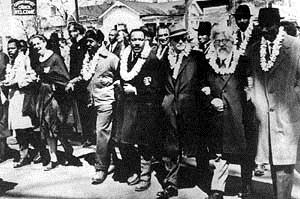Rabbi A.J. Heschel
The Heschel Center is named in memory of Abraham Joshua Heschel (January 11, 1907– December 23, 1972), leading teacher, activist, social critic, theologian, poet, philosopher, and scholar.
“Our concern with environment cannot be reduced to what can be used, to what can be grasped. Environment includes not only the inkstand and the blotting paper, but also the impenetrable stillness in the air, the stars, the clouds, the quiet passing of time, the wonder of my own being. I am an end as well as a means, and so is the world: an end as well as a means. My view of the world and my understanding of the self determine each other. Forfeit your sense of awe, let your conceit diminish your ability to revere, and the world becomes a market place for you. The complete manipulation of the world results in the complete instrumentalization of the self.”
“Humankind will not die out for lack of information, but for we may perish for want of appreciation.”
“In a free society, some are guilty, but all are responsible.”
– Abraham Joshua Heschel

Rabbi Abraham Joshua Heschel (2nd from right) in the Selma Civil Rights March with Martin Luther King, Jr. (4th from right).
About Rabbi A.J. Heschel
Heschel is an inspiration to us in that his life and ideas embody a rare synthesis of values which in lesser spirits would be contradictory: study and action, theology and ethics, a craving for wisdom and spiritual transcendence alongside a similar desire for peace and justice for all, spiritual depth and radical political activism, scholarship and social action, wonder and ‘radical amazement’ at the natural world together with speaking truth to power in the political arena. Heschel believed that humankind could not fulfill its spiritual potential without the struggle for justice, the eradication of poverty and racism, tireless action for peace, and a renewed relationship to the natural world. These are some of the guiding values of the Heschel Center for Sustainability, which is working for a sustainable society in Israel and the world. A sustainable world is one which is committed to the health of human beings and ecosystems, justice, and the preservation of the commonweal. A sustainable society is one that can sustain itself over time environmentally, socially, and economically, thereby living up to our responsibilities to future generations. It is a society that can sustain and nourish us, materially and spiritually, in the present and in the future.
Heschel’s biography
Heschel was a descendant of preeminent rabbinic families of Europe: the family of Levi Yitzchak of Berditchev, and that of Rebbe Avrohom Yehoshua Heshl of Apt, the Apter Rebbe – Ohev Yisroel. He was the youngest of six children. In his teens he received a traditional yeshiva education, and obtained traditional semicha, rabbinical ordination at the age of 16. He then studied at the University of Berlin, where he obtained his doctorate, and at the Hochschule für die Wissenschaft des Judentums, where he earned a second liberal rabbinic ordination.
Heschel’s teachers included some of the best German-Jewish teachers: Chanoch Albeck, Ismar Elbogen, Julius Guttmann, and Leo Baeck. When Martin Buber made aliyah in 1937, Heschel was appointed the head of the Lehrhaus Institute in Frankfurt, which Buber and Franz Rosenzweig had founded. Escaping from the Nazis, he found refuge first in England and then the United States, where he briefly served on the faculty of Hebrew Union College (HUC), the main seminary of Reform Judaism, in Cincinnati.
Heschel though sought an academic institution which combined critical, modern scholarship of the Bible, with a commitment to halacha. He found such a place in 1945 when he came to the Jewish Theological Seminary of America (JTS), the main seminary of Conservative Judaism, in New York. He accepted a position there as Professor of Jewish Ethics and Mysticism, where he served until his death in 1972.
Heschel authored pioneering studies in modern theology, medieval Jewish philosophy, and Biblical and Talmudic literature Heschel saw the teachings of the Hebrew prophets as a clarion call for social action in the United States and worked for civil rights and against the Vietnam War. The famous picture of him marching arm in arm with Martin Luther King Jr. in 1965 in Alabama became a symbol of the cooperation possible between Blacks and Jews in America. Heschel famously said after that march, that he felt that “his legs were praying.”
